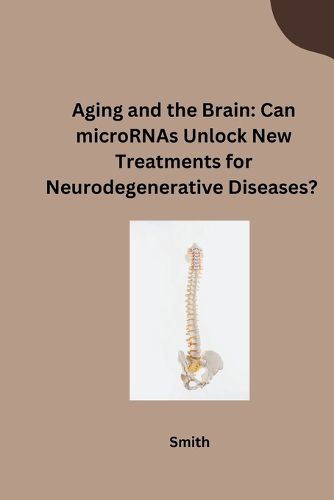Readings Newsletter
Become a Readings Member to make your shopping experience even easier.
Sign in or sign up for free!
You’re not far away from qualifying for FREE standard shipping within Australia
You’ve qualified for FREE standard shipping within Australia
The cart is loading…






The aging brain is a battlefield. As we get older, neurodegenerative diseases like Alzheimer's and Parkinson's become a looming threat. "Aging and the Brain: Can microRNAs Unlock New Treatments for Neurodegenerative Diseases?" explores the exciting potential of microRNAs, tiny molecules with a big role to play in potentially combating these devastating conditions. Imagine a new weapon in the fight against neurodegeneration: microRNAs. These microscopic regulators within cells control gene expression, influencing various cellular processes. In the context of neurodegeneration, scientists believe abnormal microRNA activity may contribute to the disease process. The potential benefits of targeting microRNAs are intriguing: - Modulating Cellular Function: By regulating microRNAs, scientists hope to influence cellular processes gone awry in neurodegeneration, potentially promoting neuron health and survival. - Early Intervention: Identifying specific microRNA patterns associated with neurodegeneration could pave the way for earlier diagnosis and intervention, before significant damage occurs. - Targeted Therapeutics: Developing drugs that manipulate microRNA activity offers a potentially more targeted approach to treatment compared to traditional medications. However, challenges remain: - Delivery Methods: Delivering microRNA-based therapies to the brain effectively and safely is a hurdle that needs to be overcome. - Disease Complexity: Neurodegeneration likely involves multiple factors beyond microRNAs. A single therapeutic approach may not be sufficient. - Long-Term Effects: More research is needed to understand the long-term safety and efficacy of microRNA-based therapies. Despite these challenges, the potential of microRNAs is undeniable: - Specificity: MicroRNAs can target specific pathways involved in neurodegeneration, potentially leading to fewer side effects. - Biomarker Potential: Studying microRNA profiles may provide valuable biomarkers for early detection an
$9.00 standard shipping within Australia
FREE standard shipping within Australia for orders over $100.00
Express & International shipping calculated at checkout
The aging brain is a battlefield. As we get older, neurodegenerative diseases like Alzheimer's and Parkinson's become a looming threat. "Aging and the Brain: Can microRNAs Unlock New Treatments for Neurodegenerative Diseases?" explores the exciting potential of microRNAs, tiny molecules with a big role to play in potentially combating these devastating conditions. Imagine a new weapon in the fight against neurodegeneration: microRNAs. These microscopic regulators within cells control gene expression, influencing various cellular processes. In the context of neurodegeneration, scientists believe abnormal microRNA activity may contribute to the disease process. The potential benefits of targeting microRNAs are intriguing: - Modulating Cellular Function: By regulating microRNAs, scientists hope to influence cellular processes gone awry in neurodegeneration, potentially promoting neuron health and survival. - Early Intervention: Identifying specific microRNA patterns associated with neurodegeneration could pave the way for earlier diagnosis and intervention, before significant damage occurs. - Targeted Therapeutics: Developing drugs that manipulate microRNA activity offers a potentially more targeted approach to treatment compared to traditional medications. However, challenges remain: - Delivery Methods: Delivering microRNA-based therapies to the brain effectively and safely is a hurdle that needs to be overcome. - Disease Complexity: Neurodegeneration likely involves multiple factors beyond microRNAs. A single therapeutic approach may not be sufficient. - Long-Term Effects: More research is needed to understand the long-term safety and efficacy of microRNA-based therapies. Despite these challenges, the potential of microRNAs is undeniable: - Specificity: MicroRNAs can target specific pathways involved in neurodegeneration, potentially leading to fewer side effects. - Biomarker Potential: Studying microRNA profiles may provide valuable biomarkers for early detection an